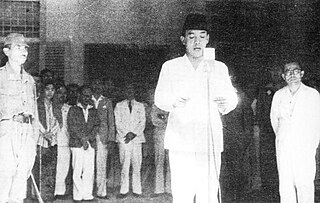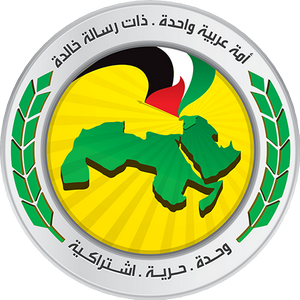Related Research Articles

The Indonesian National Revolution, also known as the Indonesian War of Independence, was an armed conflict and diplomatic struggle between the Republic of Indonesia and the Dutch Empire and an internal social revolution during postwar and postcolonial Indonesia. It took place between Indonesia's declaration of independence in 1945 and the Netherlands' transfer of sovereignty over the Dutch East Indies to the Republic of the United States of Indonesia at the end of 1949.

Sukarno was an Indonesian statesman, orator, revolutionary, and nationalist who was the first president of Indonesia, serving from 1945 to 1967.
Sectarianism is a debated concept. Some scholars and journalists define it as pre-existing fixed communal categories in society, and use it to explain political, cultural, or religious conflicts between groups. Others conceive of sectarianism as a set of social practices where daily life is organized on the basis of communal norms and rules that individuals strategically use and transcend. This definition highlights the co-constitutive aspect of sectarianism and people's agency, as opposed to understanding sectarianism as being fixed and incompatible communal boundaries.

Adam Malik Batubara was an Indonesian politician, diplomat, and journalist, who served as the third vice president of Indonesia from 1978 until 1983, under President Suharto. Previously, he served in a number of diplomatic and governmental positions, including Speaker of the People's Consultative Assembly from 1977 to 1978, Speaker of the People's Representative Council from 1977 to 1978, Foreign Minister of Indonesia from 1966 until 1977, and president of the United Nations General Assembly from 1971 until 1972.

Gerungan Saul Samuel Jacob Ratulangi, known as Sam Ratulangi, was a Minahasan teacher, journalist, politician, and national hero from North Sulawesi, Indonesia. He was part of the committee that ratified the Constitution of Indonesia and served as the first Governor of Sulawesi.

Guided Democracy, also called the Old Order, was the political system in place in Indonesia from 1959 until the New Order began in 1966. This period followed the dissolution of the liberal democracy period in Indonesia by President Sukarno, who centralized control in the name of political stability. He claimed to have based the system based on the traditional village system of discussion and consensus, which occurred under the guidance of village elders. On the national level, however, this meant centralized rule under Sukarno: martial law, a massive reduction in civil liberties and democratic norms, and the Republic of Indonesia Armed Forces and Communist Party of Indonesia acting as major power blocs.

Alexander Evert Kawilarang was an Indonesian freedom fighter, military commander, and founder of Kesko TT, which would become the Indonesian special forces unit Kopassus. However, in 1958 he resigned his post as military attaché to the United States to join the rebel Permesta movement where he encountered Kopassus as his opponent. His involvement in Permesta damaged his military career, but he remained popular and active in the armed forces community.

Ide Anak Agung Gde Agung, alternatively spelled too as Ida Anak Agung Gde Agung, was an Indonesian politician, historian, and National Hero, who was the Raja of Gianyar, Bali, and served as the prime minister of the State of East Indonesia from 1947 to 1949, and the Foreign Affairs Minister of Indonesia from 1955 until 1956.

The 1966 Syrian coup d'état refers to events between 21 and 23 February during which the government of the Syrian Arab Republic was overthrown and replaced. The ruling National Command of the Arab Socialist Ba'ath Party were removed from power by a union of the party's Military Committee and the Regional Command, under the leadership of Salah Jadid.

The 1963 Syrian coup d'état, labelled in Ba'athist historiography as the "March 8 Revolution", was the seizure of power in Syria by the military committee of the Syrian Regional Branch of the Arab Socialist Ba'ath Party. The planning and the unfolding conspiracy of the Syrian Ba'athist operatives were prompted by the Ba'ath party's seizure of power in Iraq in February 1963.

The Papua conflict is an ongoing conflict in Western New Guinea (Papua) between Indonesia and the Free Papua Movement. Subsequent to the withdrawal of the Dutch administration from the Netherlands New Guinea in 1962 and implementation of Indonesian administration in 1963, the Free Papua Movement has conducted a low-intensity guerrilla war against Indonesia by targeting its military and police, along with ordinary Indonesian civilians.

Indonesia and the Netherlands share a special relationship, embedded in their shared history of colonial interactions for centuries. It began during the spice trade as the Netherlands established the Dutch East Indies Company (VOC) trading post in what is now Indonesia, before colonising it as the Dutch East Indies until the mid-20th century. Indonesia was the largest former Dutch colony. In the early 21st century, the Dutch government has committed to boosting its relationship with Indonesia, noting that economic, political, and interpersonal contacts should be further strengthened.

The First Iraqi–Kurdish War, also known as the September Revolution, was a major event of the Iraqi–Kurdish conflict, lasting from 1961 until 1970. The struggle was led by Mustafa Barzani, in an attempt to establish an independent Kurdistan. Throughout the 1960s, the uprising escalated into a long war, which failed to resolve despite internal power changes in Iraq. During the war, 80% of the Iraqi army was engaged in combat with the Kurds. The war ended with a stalemate in 1970, resulting in between 75,000 to 105,000 casualties. A series of Iraqi–Kurdish negotiations followed the war in an attempt to resolve the conflict. The negotiations led to the Iraqi–Kurdish Autonomy Agreement of 1970.

Soepomo was an Indonesian politician and lawyer who served as the country's first Minister of Justice from August until November 1945 and again from December 1949 until 6 September 1950. Known as the father of Indonesia's constitution, he was posthumously declared an Indonesian National Hero by President Sukarno in 1965.

The Arab Socialist Ba'ath Party – Syria Region, officially the Syrian Regional Branch, was a neo-Ba'athist organisation founded on 7 April 1947 by Michel Aflaq, Salah al-Din al-Bitar and followers of Zaki al-Arsuzi. The party ruled Syria from the 1963 Syrian coup d'état, which brought the Ba'athists to power, until 8 December 2024, when Bashar al-Assad fled Damascus in the face of a rebel offensive during the Syrian Civil War. The party suspended all activities on 11 December 2024 until further notice.

Major General Muhammad Umran was a Syrian military officer and founding member of the Military Committee of the unitary Ba'ath Party. He was a leading figure in Syrian politics from the 1963 Syrian coup d'état until the 1966 coup d'état.

Indonesia and South Korea established diplomatic relations in 1973. Both countries share a common vision, values and the will to contribute to the international community as middle powers. Both countries are members of G-20 and APEC. South Korea has an embassy in Jakarta and Indonesia has an embassy in Seoul. According to a 2014 BBC World Service Poll, 48% of Indonesians view South Korea's influence positively, with 27% expressing a negative view. The Chinese Indonesian merchant Chen Yanxiang visited Korea between the 1390s and the 1410s, the first major contact between the two nations.

Indonesia–New Zealand relations are foreign bilateral relations between Indonesia and New Zealand. Having common interests as democracies and neighbours in the Asia Pacific region, New Zealand and Indonesia are viewed as natural partners. Both countries are members of APEC. Indonesia and New Zealand officially established diplomatic relations on 28 June 1958. New Zealand has an embassy in Jakarta, and Indonesia has an embassy in Wellington.
References
- ↑ Countering terrorism and insurgency in the 21st century: international perspectives, Volume 3, p. 433, James J. F. Forest, Greenwood Publishing Group, 2007, ISBN 0-275-99037-0, ISBN 978-0-275-99037-4, accessed 19 December 2009
- ↑ ""Ambassade van het Koninkrijk der Nederlanden in Jakarta, Indonesië: Curriculum Vitae, Dr. Nikolaos van Dam, Ambassador Extraordinary and Plenipotentiary of Her Majesty the Queen of the Netherlands in Jakarta," website of the Embassy of the Kingdom of the Netherlands in Indonesia, accessed 19 December 2009". Mfa.nl. Archived from the original on 20 June 2008. Retrieved 18 March 2010.
- ↑ The struggle for power in Syria: sectarianism, regionalism, and tribalism in politics, 1961–1978, Nikolaos van Dam, Taylor & Francis, 1979, ISBN 0-85664-703-9, ISBN 978-0-85664-703-1, accessed 19 December 2009
- ↑ The struggle for power in Syria: sectarianism, regionalism and tribalism in politics, 1961–1994, 1995, accessed 19 December 2009 . Retrieved 18 March 2010.